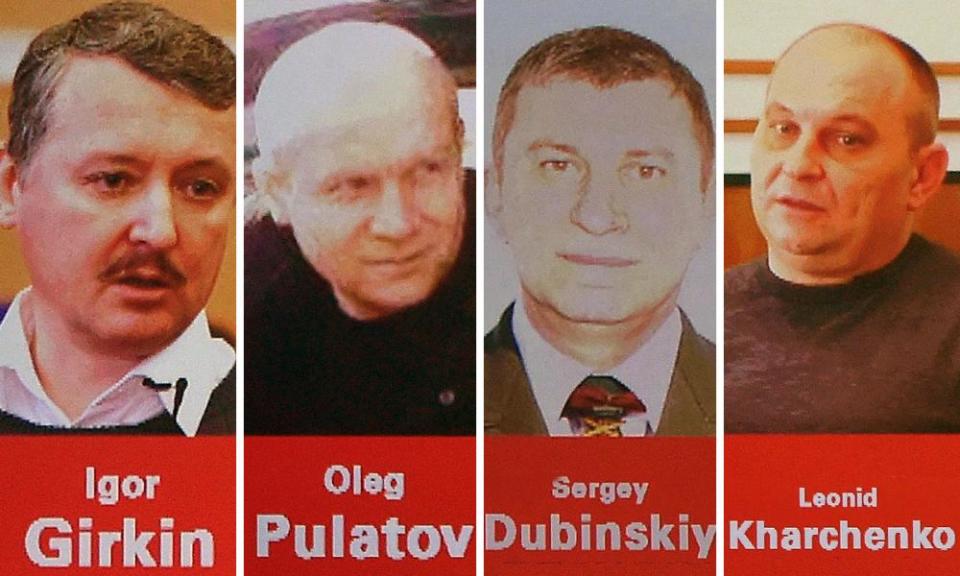MH17: the four Russian-backed separatists named as suspects

Dutch-led investigators have named four Russian-backed separatists as their first suspects for the shooting down in 2014 of the Malaysia Airlines flight MH17 over east Ukraine.
The four men include former military officers who occupied senior positions in Russian-backed militias in east Ukraine that year, including Igor Girkin, who was named as minister of defence for the Donetsk People’s Republic.
The other suspects named, Sergei Dubinsky, Oleg Pulatov, and Leonid Kharchenko, were members of the separatists’ military intelligence unit. Several had previously been charged with committing acts of terrorism by Ukraine in 2017.
The investigators said on Wednesday they had reviewed intercepted phone conversations, as well as open-source information, and concluded that the men had conspired to transfer and fire the Buk missile system that brought down the passenger jet during its flight from Amsterdam to Kuala Lumpur on 17 July 2014, killing 298 people.
Criminal charges against the four men are expected to begin in the Netherlands in March 2020.
The absence of active-duty Russian soldiers, particularly those who commanded or transferred the missile system, could be taken with a sign of relief in Moscow. While soldiers are part of a chain of command leading up to Vladimir Putin, Russia’s president, Moscow can more readily disavow the actions of its proxies in Ukraine.
Igor Girkin
A former colonel in Russia’s FSB who commanded the separatists was charged with obtaining the Buk missile system from Russia, Girkin, who also goes by the nom de guerre Strelkov, was an early leader of the armed groups that seized Crimea and then began fighting in east Ukraine. Notably, he led separatist armed forces fighting against Kyiv in the city of Sloviansk, before ceding the city in a retreat to Donetsk in July 2014.
Reached by telephone on Tuesday, Girkin declined to comment about the accusations and hung up.
A nationalist and military reenactment enthusiast, Girkin was known to stroll the halls of the Donetsk rebel headquarters with a vintage Stechkin pistol. He is also a former employee of the Russian businessman Konstantin Malofeev, who was sanctioned by the US in 2014 for “[funding] separatist activities in eastern Ukraine.”
Girkin fell out of favour with the Kremlin and rivals in east Ukraine and was eventually forced out of the country and back to Russia in August 2014. Living in relative obscurity and penury in Russia, he has become a vocal critic of the Kremlin for not applying more pressure and seizing more territory in Ukraine.
“Putin and his circle have recently taken steps which I believe will almost inevitably lead to the collapse of the system,” he told the Guardian in 2016. Recently he also recently attempted to sell the gold medal he was awarded in 2014 for his role in the occupation of Crimea.
Sergei Dubinsky
A former Russian military intelligence officer who served in Afghanistan, Dubinsky has been accused of overseeing the transport of the Buk missile launcher used to down MH17. Born in Donetsk but living in Russia’s Rostov region, he headed the military intelligence of the Donetsk People’s Republic and was subordinate to Girkin. Identified as Khmury on intercepted phone calls, he directed subordinates to move the Buk missile along with tanks heading to support the militia’s fighters.
According to the investigative website Bellingcat, Dubinsky was an avid user of an online forum called Antikvariat, where users including Girkin discussed military history and antiques. He uploaded a photograph of himself in military uniform to the site. Dubinsky and Girkin knew each other from their time in Chechnya, where both served during the 1990s. Novaya Gazeta later reported that Dubinsky had been expelled from the Donetsk People’s Republic for alleged financial fraud. He is believed to be living in Russia’s Rostov region.
Oleg Pulatov
A subordinate of Dubinsky, Pulatov, a former lieutenant colonel in the Russian armed forces, was also accused of escorting the Buk missile launcher. Described as another active user of the website antikvariat, Pulatov was born in the Russian city of Ulyanovsk. He is a veteran of the Afghanistan and Chechen wars and left the Russian military in 2008.
Online information gathered by Bellingcat indicates that he graduated from the MV Frunze military academy, in Kyiv, in 1990, after serving in Afghanistan. He received a letter of gratitude for his service from Putin in 2002.
Pulatov arrived in east Ukraine in 2014 and fought on and off until 2018, when he was imprisoned in the region of Luhansk. According to Bellingcat, he recently wrote on social media that he had moved back to Russia, without giving any further details.
Leonid Kharchenko
A Ukrainian citizen who went by the codename “Krot”, or mole, Kharchenko was also a member of the Donetsk People’s Republic’s “military intelligence” unit.
He served under the three other suspects and was suspected of handling the Buk missile and arranging for its transport. Little is known about his past, including any military career, although he confirmed in an interview with a pro-separatist media resource that he was born in the Ukrainian city of Konstantynovka in 1972.
In intercepted telephone conversations, Kharchenko confirmed to Dubinsky that the Buk had returned to Russia. His whereabouts are unknown.

 Yahoo News
Yahoo News 